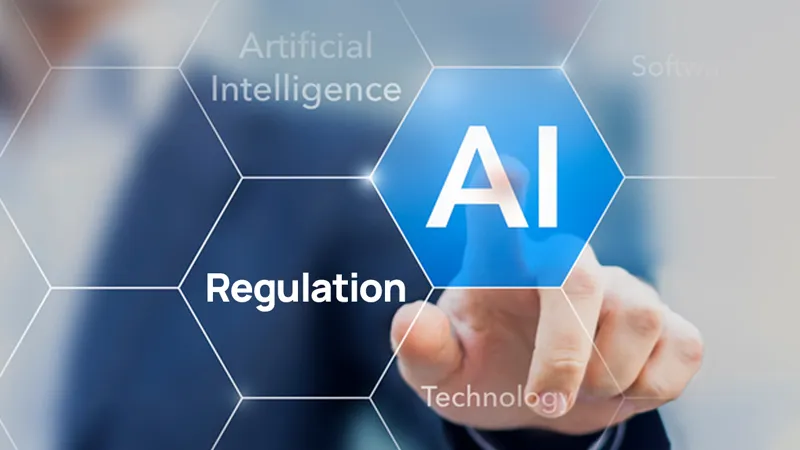
Upcoming AI Laws and Regulations in the USA
Are you ready for the upcoming laws and regulations surrounding AI technology in the USA? A s we move towards a more AI-driven future, it is important for businesses to stay informed and compliant in order to mitigate potential risks and ensure ethical use of AI. At Cream Digital Ai, we are constantly staying up-to-date with the latest developments in AI regulation and compliance to provide our clients with cutting-edge solutions. Sign up for a free AI consultation with us today and discover how our customized AI solutions, including our new AI phone and avatar agents, can enhance your business operations while meeting regulatory requirements. Stay ahead of the curve with Cream Digital Ai.
Executive Order on Artificial Intelligence
Recently, the United States government has taken significant steps in shaping the future of AI regulation, and as a business operating in this rapidly evolving landscape, it's crucial to stay informed about the upcoming AI laws and regulations. The Executive Order issued by President Biden has been a pivotal development, reflecting the government's strong focus on ensuring the safe, secure, and ethical deployment of AI systems. The order underscores the administration's commitment to fostering innovation while addressing the potential risks associated with AI technology. It sets the stage for a comprehensive regulatory framework that is anticipated to have far-reaching implications for businesses and organizations utilizing AI in various capacities.
Furthermore, the Executive Order places a strong emphasis on the responsible and equitable use of AI, aiming to prevent algorithmic discrimination and promote transparency in automated decision-making processes. These core principles are set to shape the future landscape of AI development and deployment, and businesses must proactively align their AI strategies with the envisioned regulatory requirements to ensure compliance and ethical use of AI technology.
Congress
The activities in the US Congress pertaining to AI legislation and regulation are of paramount importance to businesses leveraging AI technologies. The legislative branch's role in shaping the regulatory environment for AI is substantial, and the proposed and upcoming AI-related bills and regulations demand close attention from businesses. The potential impact of these legislative efforts on AI governance, data privacy, and the overall business landscape is significant, and as such, it is crucial for businesses to stay open of these developments to adapt their AI strategies and operations accordingly.
Notably, the introduction of new AI legislation in Congress has been a focal point of the ongoing developments. These legislative initiatives are poised to address a wide range of AI-related considerations, including but not limited to data privacy, algorithmic accountability, and the ethical use of AI. As a result, businesses must closely monitor the progress of these legislative efforts to anticipate and prepare for the evolving regulatory requirements and compliance standards in the realm of AI.
NIST Risk Management Framework
The release of the AI Risk Management Framework by the National Institute of Standards and Technology (NIST) in January 2023 represents a significant milestone in the development of a structured and comprehensive approach to AI risk management. This framework is designed to provide guidance and best practices for organizations in the effective identification, assessment, and mitigation of AI-related risks, serving as a crucial resource for businesses navigating the complexities of AI governance and compliance.
By familiarizing themselves with and leveraging the principles outlined in the NIST AI Risk Management Framework, businesses can enhance their risk management capabilities in the context of AI deployment and align their practices with established standards for AI risk mitigation. Embracing this framework represents a proactive and strategic measure for businesses to fortify their AI governance strategies and demonstrate a commitment to the responsible and secure implementation of AI technologies.
FTC Regulatory Efforts
The regulatory efforts of the Federal Trade Commission (FTC) in the domain of AI have profound implications for businesses, particularly in the areas of consumer protection and the prevention of deceptive or unfair AI-related practices. The proactive stance of the FTC in addressing emerging AI challenges and risks underscores the imperative for businesses to prioritize compliance with AI regulations and best practices, safeguarding the interests of consumers and the integrity of the market landscape.
As the FTC continues to advance its regulatory initiatives related to AI, businesses must closely monitor and align with the evolving regulatory expectations to uphold the highest standards of transparency, accountability, and consumer welfare in their AI-driven endeavors. By engaging in proactive collaboration with regulatory authorities and adhering to the emerging FTC guidelines for AI, businesses can strengthen consumer trust and confidence in their AI applications and contribute to a more ethically and legally sound AI ecosystem.
State Laws
The landscape of AI regulation in the United States is notably influenced by the emergence of state-specific laws governing the development, deployment, and use of AI technologies. State-level regulatory measures pertaining to data privacy, algorithmic accountability, and the ethical use of AI can significantly impact businesses operating across various states, necessitating a nuanced and comprehensive understanding of the evolving state-level AI regulatory landscape.
Businesses must proactively engage with the intricacies of state AI laws to ensure harmonization of their AI practices with diverse regulatory requirements, thereby mitigating the risks of non-compliance and ethical transgressions. The dynamic nature of state-level AI regulations further accentuates the importance of agile and adaptive AI governance strategies, enabling businesses to navigate the distinct regulatory expectations across different states and uphold a consistent standard of responsible and ethical AI utilization.
Sector-Specific Regulations
The establishment and enforcement of sector-specific regulations pertaining to AI wield a profound influence on businesses operating within specialized domains, as these regulations are tailored to address the unique challenges and considerations prevalent in specific industry sectors. Whether in healthcare, finance, transportation, or other sectors, the sector-specific AI regulations demand meticulous attention and proactive alignment from businesses to ensure compliance while meeting the sector's distinct operational and ethical requirements.
From safeguarding the confidentiality and integrity of healthcare data in AI-driven medical applications to upholding the financial transparency and accountability in AI-powered fintech solutions, the sector-specific AI regulations present both compliance challenges and opportunities for businesses. By cultivating a deep understanding of the sector-specific AI regulatory landscape and integrating sector-tailored compliance measures into their AI strategies, businesses can navigate regulatory complexities with confidence and contribute to the advancement of responsible and effective AI deployment within their respective industries.
Federal Strategy and Investments
The strategic direction and investment priorities outlined by the federal government in the realm of AI reflect an overarching blueprint that influences the landscape of AI development, deployment, and regulation across the United States. From research and development funding to national AI strategy and governance, the federal AI strategy and investments exerted a formative impact on the opportunities and compliance imperatives facing businesses leveraging AI technologies.
By aligning with the focal points and investment thrusts outlined in the federal AI strategy, businesses can position themselves to leverage research and development incentives, infrastructure support, and strategic partnerships that underpin the national AI agenda. Furthermore, an astute awareness of the federal AI investment landscape empowers businesses to make informed decisions their own AI investments and development efforts, ensuring synergy with the larger national vision for AI advancement and regulatory compliance.
Data Privacy and Security Rules
The domain of data privacy and security stands as a linchpin of AI governance and regulatory compliance, with far-reaching implications for businesses entrusted with the collection, processing, and utilization of personal and sensitive data in their AI systems and applications. As data privacy and security rules continue to evolve and expand in response to the advancing AI landscape, businesses must uphold a steadfast commitment to the ethical and legal safeguarding of individuals' personal information, mitigating the risks of non-compliance and data breaches.
By embracing a proactive and holistic approach to data privacy and security, businesses can not only comply with the existing and upcoming regulations but also fortify the trust and confidence of their customers and stakeholders in the responsible handling of personal data within their AI ecosystems. A thorough understanding of the interconnected dynamics between AI, data privacy, and security rules equips businesses to proactively address compliance challenges and leverage data-driven insights and capabilities in a manner that upholds the highest standards of individual rights and data protection.
AI Safety Boards Guidance
The guidance and directives emanating from AI safety and security boards carry significant weight in shaping the ethical and operational contours of AI governance and deployment. As businesses navigate the dynamic landscape of AI safety and security regulations and recommendations, the insights and best practices articulated by these specialized advisory bodies serve as invaluable beacons guiding businesses toward the realization of robust, ethical, and compliant AI strategies and operations.
By actively engaging with and internalizing the guidance issued by AI safety boards, businesses can cultivate a culture of continuous improvement and ethical diligence in their AI practices, elevating the standard of AI safety and security while fostering stakeholder trust and regulatory alignment. Embracing the precepts and recommendations set forth by AI safety boards empowers businesses to not only navigate the current regulatory expectations but also proactively anticipate and adapt to the future trajectory of AI governance and safety, positioning themselves as ethical trailblazers in the evolving AI landscape.
The White House AI Executive Order
The White House AI Executive Order, under the administration's innovative and impactful leadership, has laid a robust foundation for the design and development of a future-ready AI regulatory framework, one that prioritizes the harmonious coalescence of innovation, ethics, and security in the AI landscape. It underscores the government's unwavering commitment to enshrining the principles of responsible and transparent AI deployment while championing the imperatives of equity, accountability, and the safeguarding of individual and collective rights in the age of AI.
As businesses chart their course in the wake of the White House AI Executive Order, it becomes imperative for them to recalibrate their AI strategies, development endeavors, and operational paradigms to resonate with the ethical and regulatory precepts promulgated by the executive order. By embracing the mandates and spirit of the White House AI Executive Order, businesses can position themselves as key contributors to an AI ecosystem characterized by safety, fairness, and societal value, thereby fortifying their competitive standing and ethical reputation in an AI landscape shaped by visionary regulatory imperatives.
New AI Legislation in Congress
The advent of new AI legislation in Congress heralds a pivotal phase in the evolution of AI governance and regulation, presenting businesses with a compelling impetus to realign their AI strategies and operations with the emerging legislative mandates and ethical benchmarks. The legislative developments bear testament to the proactive commitment of the government to craft a responsive and forward-looking regulatory framework that safeguards individual liberties, promotes ethical AI innovation, and addresses the multifaceted risks and challenges entwined with AI implementation.
For businesses, the new AI legislation in Congress serves as a catalyst for introspection, adaptation, and strategic recalibration, calling for a comprehensive assessment of their AI governance and deployment practices in light of the evolving legal and ethical standards. By proactively engaging with and integrating the requirements of the new AI legislation into their operational fabric, businesses can engender a culture of principled AI innovation and regulatory compliance, thereby fostering consumer trust, stakeholder confidence, and sustainable value creation in a conscientiously regulated AI landscape.
NIST AI Risk Management Framework
The unveiling of the NIST AI Risk Management Framework marks a watershed moment in the journey toward cultivating a proactive, risk-aware, and ethically attuned approach to AI governance and deployment. This comprehensive framework, underpinned by industry-leading expertise and regulatory acumen, equips businesses with a robust scaffolding to effectively identify, evaluate, and mitigate the diverse dimensions of risk emanating from AI utilization, thereby fostering a climate of responsible and resilient AI innovation.
By earnestly acquainting themselves with and monumental year embracing the tenets of the NIST AI Risk Management Framework, businesses can transcend the traditional paradigms of risk management and engender a culture of risk intelligence and ethical prudence in their AI undertakings. The strategic assimilation of this pioneering framework into the fabric of AI governance and operational decision-making not only fortifies businesses against potential liabilities and ethical transgressions but also amplifies their capacity to proactively adapt to the emerging contours of AI regulation and risk dynamics, sculpting a legacy of principled and future-proof AI leadership.
Conclusion
As the field of artificial intelligence continues to evolve and expand, so do the laws and regulations surrounding its use. Keeping up with these changes and ensuring compliance can be a daunting task for businesses. However, with the recent release of the EU AI Act and the NIST AI Risk Management Framework, it is clear that comprehensive regulations are necessary for the responsible development and deployment of AI. At Cream Digital Ai, we understand the importance of compliance and risk management in the fast-paced world of AI. That's why we offer specialized training on the EU AI Act, GDPR, and other relevant regulations, as well as mitigate compliance risks for our clients. We stay up to date on the latest regulatory actions in the US, such as the Executive Order for safe and trustworthy AI and the launch of the AI Safety and Security Board. With our expertise in AI technology and compliance, we are well-equipped to guide businesses through the ever-changing landscape of AI regulations in the US. Don't wait until it's too late. Stay ahead of the curve by signing up for a free AI consultation with Cream Digital Ai.








